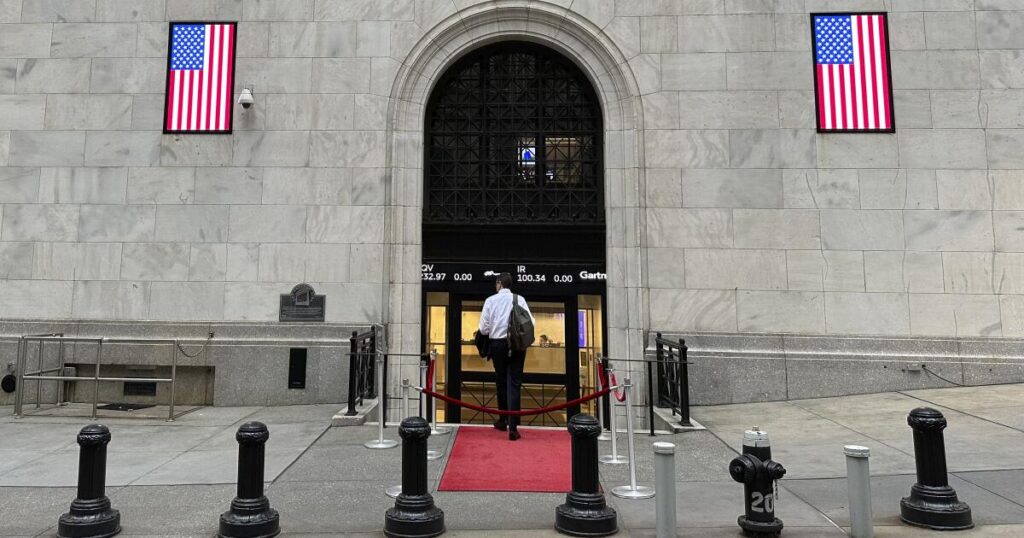Wall Street's record rally hit a wall on Wednesday as worries about a worsening trade dispute with China hit shares of semiconductor companies, giving stock indexes their worst day in months, even though things may not have been so bad underneath the surface.
The Standard & Poor's 500 stock index fell 1.4% from the previous day after hitting its 38th all-time high this year. The Nasdaq Composite Index fell 2.8%, its biggest drop since 2022, due in part to declines in major tech companies such as Nvidia.
However, advancers slightly outnumbered decliners in the S&P 500 Index, and the Dow Jones Industrial Average rose 0.6% from its record high set the previous day.
The combination marks a continuation of a recent trend that market watchers are calling encouraging: More stocks are rising than just a few dominant elite names.Small-cap stocks in the Russell 2000 Index had rallied for five straight days on hopes that interest rates would ease and the U.S. economy would avoid a recession, but the index gave up some of its gains on Wednesday, falling 1.1%.
Market attention was on semiconductor companies, which fell sharply after Bloomberg reported that President Biden was considering the toughest trade restrictions if companies such as Netherlands-based ASML and Japan's Tokyo Electron continue to export advanced semiconductor technology to China. The U.S. government has been blocking China's access to advanced semiconductors and their manufacturing equipment, citing security concerns, and has urged allies to do the same.
ASML shares fell 12.7% in U.S. trading even though the company said its spring sales were at the top end of its forecast range, while Tokyo Electron shares fell 7.5% in Tokyo, trimming their gains this year to 32.2%.
Taiwan Semiconductor Manufacturing Co. (TSMC), another major chipmaker, saw its shares fall after former President Trump criticized the self-ruled islands claimed by China and which the United States is bound by treaty to defend if attacked.
“Taiwan should pay for our defense,” Trump said, according to a transcript of the interview published by Bloomberg. “Taiwan took our semiconductor business. How stupid of us,” he said.
Taiwan Semiconductor's U.S.-listed shares fell 8%.
The repercussions were felt across semiconductor stocks around the world, including the U.S. giant that has become Wall Street's biggest star this year amid a frenzy over artificial intelligence technology. Nvidia fell 6.6% after soaring 155.2% this year through Tuesday.
Advanced Micro Devices fell 10.2% and Broadcom dropped 7.9%.
The performance of big tech stocks outweighs indexes like the S&P 500, which are weighted toward larger companies. That was a boon in recent years when a handful of companies known as the “Magnificent Seven” were able to soar largely independent of the broader economy and interest rates, helping to mask underlying weakness as the economy struggled with high interest rates aimed at taming inflation.
But now some critics say the “Magnificent Seven” stocks are too expensive, and investors are beginning to dip back into less-popular areas of the market.The economy remains resilient, the job market remains strong and investors widely expect inflation to slow and for the Federal Reserve to start cutting interest rates in September.
“The market can't keep rising forever on the back of a handful of stocks,” said JJ Kinahan, CEO of IG North America.
Johnson & Johnson shares have fallen this year, but they rose 3.7% in the most recent quarter after beating analysts' profit expectations. That's one of the main reasons the Dow was able to rise even as the Magnificent Seven — Alphabet, Amazon, Apple, Meta Platforms, Microsoft, Nvidia and Tesla — each fell at least 1%.
U.S. Bancorp, which has lagged the broader market this year, rose 4.6 percent after profit and revenue beat analysts' expectations.
Among the Wall Street losers was Five Below, a retailer that sells items for under $5 to teenagers. The company's shares fell 25.1% after Chief Executive Joel Anderson resigned and a board member left the company. The company also announced a second-quarter profit outlook that fell short of analysts' expectations.
Shares of low-cost carrier Spirit Airlines fell 10.8% after the company cut its second-quarter earnings outlook and said non-ticket fee revenue was lower than expected.
In the end, the S&P 500 fell 78.93 points to 5,588.27, the Dow rose 243.60 points to 41,198.08 and the Nasdaq Composite lost 512.42 points to 17,996.92.
In the bond market, the yield on the 10-year Treasury note fell to 4.14% from Tuesday's close of 4.16%.
Overseas stock markets, London's FTSE 100 index rose 0.3% after data showed inflation held steady at the Bank of England's 2% target in June. Indexes elsewhere in Europe and Asia were mixed.
Choi is a contributor to The Associated Press.

